SEX WORKERS IN IRELAND DEMAND THEIR HUMAN RIGHTS
Women’s rights and gender equality issues have exploded into public consciousness in recent years, with the #MeToo movement galvanizing millions of people worldwide to demand change. But one demographic facing such human rights violations every day has struggled to make people hear them and their demands.
Sex workers are among the most marginalized and stigmatized people in our societies. Harmful laws and practices combined with structural and systemic barriers – including racism, transphobia, gender stereotypes and socio-economic inequalities – are often at the root of high levels of violence and other human rights abuses against them.
In 2017 Ireland reformed the Sexual Offences Act and criminalized the purchase of sex, with the stated aim of better addressing human trafficking for sexual exploitation and making it easier for sex workers to report violence.
Five years on, as the Irish government reviews the operation of its 2017 law, new research by Amnesty International exposes how stigma, and the legal framework in place in Ireland, are causing sex workers harm.
Here sex workers share their lived experiences, insights and demands for a better world, free from unjust criminal laws, violence and stigma; where their human rights and dignity are respected and upheld.*
*NOTE: Amnesty has protected the identity of some of the people who we have spoken to by using a pseudonym in accordance with their wishes.
Safety and wellbeing
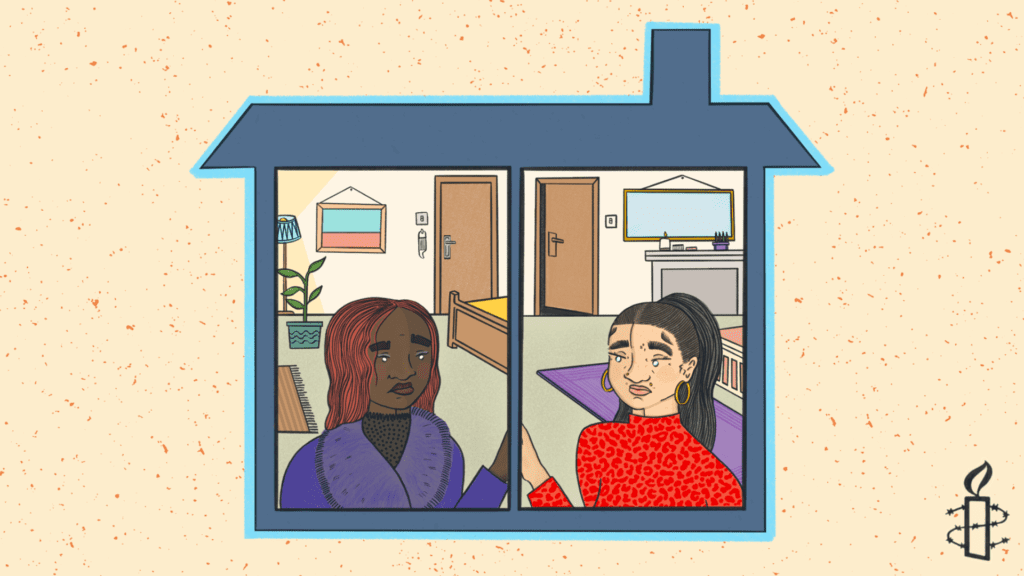
Sex workers often experience horrific human rights abuses. They have told us that in Ireland, this is in part due to the laws that instead of protecting them from violence, endanger, stigmatize and marginalize them.
In Ireland selling sex is legal but the activities around it are not. This includes a ban on buying sex. ”Vanessa”, an Irish street sex worker, says the law fails to make her safer because she has to hide in remote places, take more risks and has fewer chances to seek help:
“I was going down a cul de sac that was discreet, so I wasn’t going to be found by the Guards here, you know, they couldn’t drive by the spot we were in. But at the same time, I had no escape route, if anything went wrong… And that was a very direct result of the Garda presence there targeting of clients… So yeah, they’re not targeting me, but it has as much of an effect on my ability to survive if they want.”
Under the brothel keeping provision in Irish law, sex workers who work together in a residence for safety are viewed as brothel keepers and risk hefty fines and even jail if convicted. Renting accommodation or premises to sex workers can also be prosecuted as a crime under this provision or another one, which criminalizes “living on earnings of prostitution.”.
“It’s just not right … You’re not allowed now to be working where there’s two people, which is ridiculous. Just for safety. As well as for company. …It’s horrendous they’re not allowed to work in pairs.”, says “Ashley”, an Irish woman in her 50s.
“Please take this law out, let us work together, we don’t do any harm… It’s dangerous to work alone. Very dangerous.”, adds “B.”, a 31-year-old Romanian sex worker.
“I was just so paranoid that I’d be caught doing it and obviously I can’t afford to lose my money on fines or anything like that. So, really, that policy has just completely isolated me….”, explains “Poppy”, a 24-year-old Irish student about the impact of the law on her well-being.
Adeline, a trans and intersex activist and PhD student, says she and her wife, who is also a sex worker, were evicted from the flat where they were living and working in Dublin because of these laws.
“Gardaí [police officers] never work alone, but sex workers can’t work together?”
Adeline, trans and intersex activist
“We really just lost everything… We sank everything we had in the space; it was really beautiful. We sank every penny we had into it, like complete morons, and we had nothing left. We considered a planned suicide for a while afterwards more seriously than I had in a long time”.
Fear of prosecution and a profound lack of trust in the police affect sex workers’ ability to report crimes against them.
“If today, if I was living in my apartment and there were two or three of us in there doing it and something happened to me, I probably wouldn’t go to the guards because they would raid my house a week later”, says Trish a 35-year-old Irish student.
“Nia”, a 26-year-old mixed-race Irish woman, says racism also plays a key role here:
“It’s a lot of foreign nationals that are being prosecuted for it in Ireland… I am looked at as a foreign national, even though I’m not, so I’m more likely to be prosecuted for that.”
“A.”, a migrant sex worker, works alone and experienced three violent incidents, including oral rape, yet going to the police is not an option for them:
“I want to get Irish citizenship. Any criminal record would be detrimental. If I’m working with someone else, it’s putting me at higher risk. I’d personally rather be at risk with a client than with a police officer… I don’t want to go to jail. I’d kill myself.”
A life free from stigma and prejudices
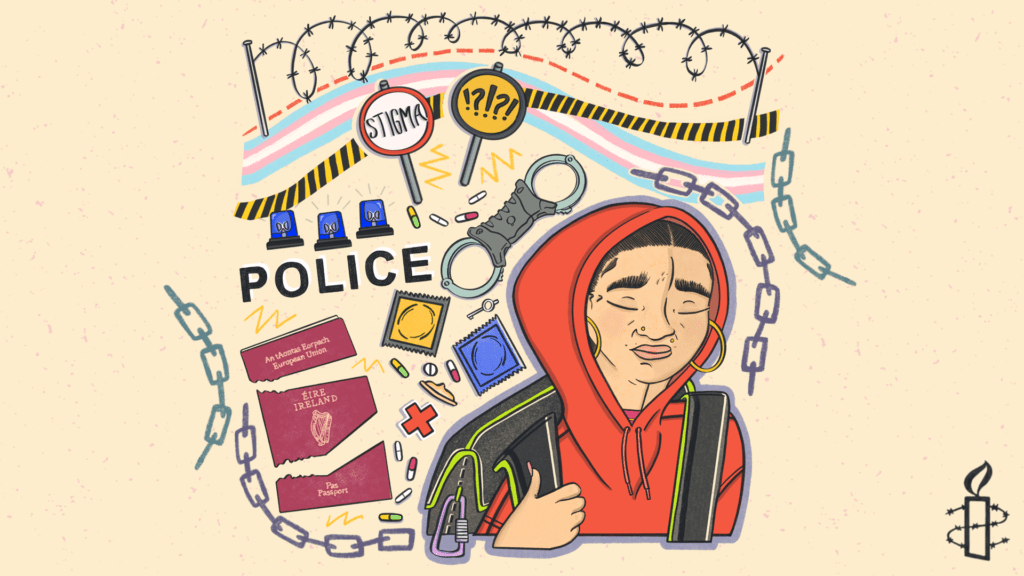
Sex workers are relentlessly campaigning against the pervasive stigma they face that exacerbates gender-based violence and stops them from accessing help and services they are entitled to.
“Few people know I work… If people knew a sex worker was living in there, they’d nearly stone them out of the house.”, says “Ashley”.
“There’s a stigma and people look down on us as trash”, adds “M.R.T.R”, a 40-year-old Irish woman with experiences of drug use and homelessness.
“Vanessa”, describes how the general public perceive street sex workers:
“I think opinions range from being very negative – you know, that ‘you’re scumbags, you’re dirt’, ‘you’re criminals’ – to the kind of pitiful and pathetic image the other people might have. And so, the ‘kind view’ of street workers is one dripping in sympathy.”
Rape is under-reported everywhere, and women and girls are disproportionally impacted by its destructive effects. For sex workers, barriers to reporting gender-based violence, including rape, are further compounded by additional myths that reinforce the harmful belief that sex workers always consent to sex. Consenting to sex doesn’t mean consenting to violence.
Anybody can be raped, even if you are a sex worker.
“Neka”
“I think that there is a kind of perception by a lot of people that if you are a sex worker you can’t be raped. Anybody can be raped, even if you are a sex worker” says “Neka”, a 27-year-old British sex worker living in Ireland.
A seat at the table
For many of the sex workers interviewed for Amnesty International’s report, the central issue about the ongoing review of the law is the lack of consultation of sex workers in the process so far.
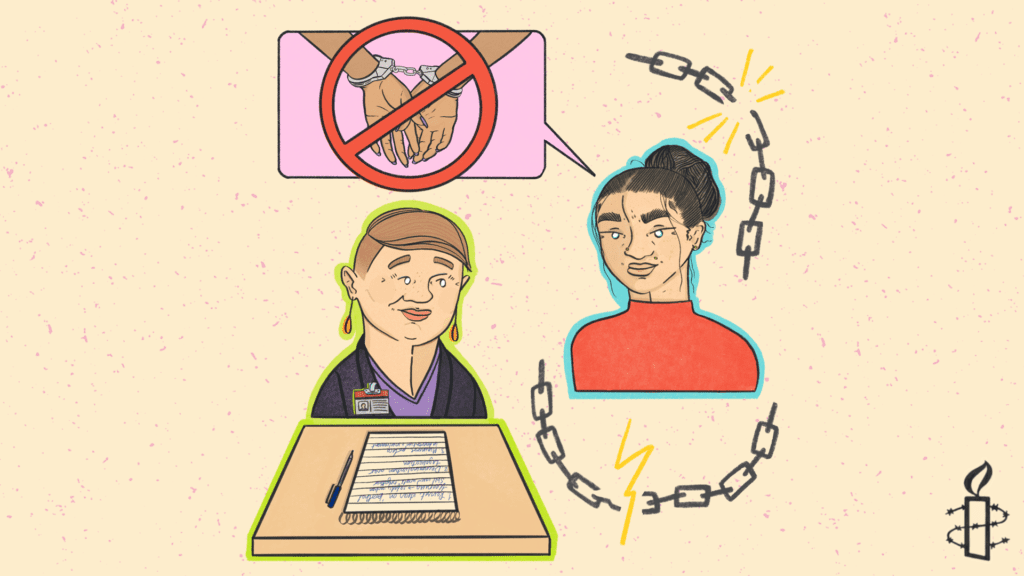
How about we try listening to the people who actually know what’s going on?
“Kristina”
“How about we try listening to the people who actually know what’s going on, who know what they’re talking about for once?”
“Kristina” is a 22-year-old student and sex worker based in Dublin. Her frustration is shared by many sex workers who too often see how law and policies that affect their lives are decided without consulting them.
The threats sex workers face are not just from clients or individuals in society; the very system they and we live within is at the root of much of the violence they face.
As Amnesty’s report highlights, laws intended to protect them are exacerbating risks they face, alongside other structural and systemic factors like racism, transphobia, stigma and socio-economic barriers. With an issue so complex and intersecting, surely the people most affected by it should be consulted by the State?
Ignoring sex workers’ experiences of violence when developing and reviewing laws and policies that affect them only puts them in greater danger, like “Aoife”, a 29-year-old sex worker who was raped by a client:
“First I was angry at the guy who did this… But then my second reaction was to get really angry at the Guards [Irish police] and really angry at the government and politics and the state. Because I’m in a situation where this was able to happen because of these laws.”
Respect for sex workers’ individual decisions
No one should be coerced to sell sex and everyone should be able to leave sex work if and when they choose to, but those who decide to sell sex for a living are entitled to safety, dignity and for their human rights to be protected.
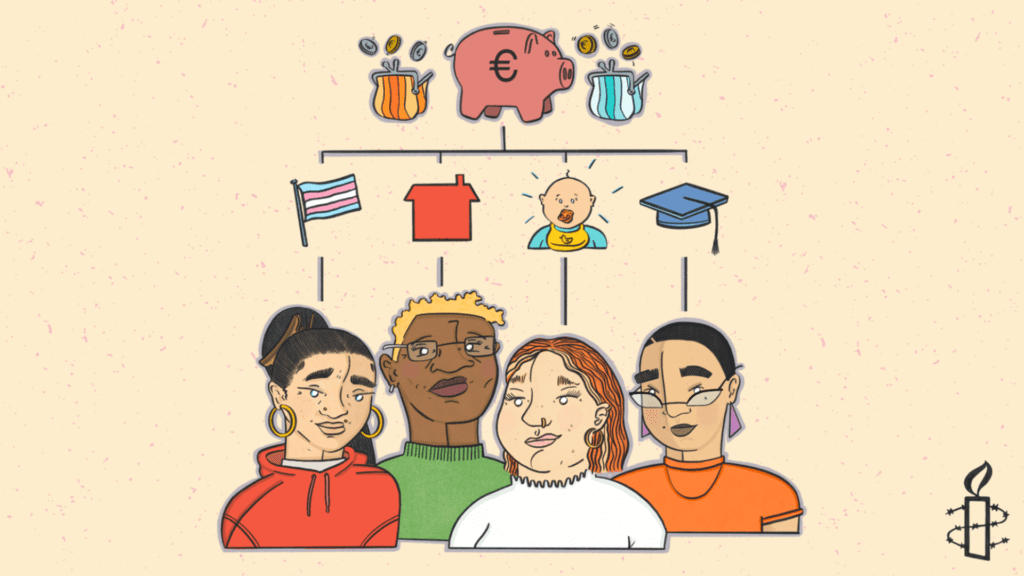
This is such an intersectional issue…
“Aoife”
The reasons for doing sex work are often complex and intersecting. Sex workers tell us that difficult circumstances do not eliminate their individual ability to make decisions about their own lives.
“This is such an intersectional issue, where you have issues of gender identity, of migration, of all these different things involved with poverty, homelessness, parenting, single parents, I mean, the list is endless… When someone looks at the situation they’re in and says, Okay, I need to do this kind of work…. I don’t have access to a legal income, or I’m a migrant, or I’m a trans person who’s trying to get access to healthcare, I need to make a certain amount…people are making decisions in those situations”, explains “Aoife”, who is a trans and non-binary person.
“Vanessa”, who has experience of drug use and homelessness says:
“I just couldn’t afford clothes. And I just couldn’t even get the basics. And naturally, I thought, again, I’ll go back to what I know, and because, you know, even after years of supposedly working in services, the only work that I’ve ever really gotten paid for in my life is sex work… And actually, part of going back to street work was because it was like, that’s my home, and I feel pushed out of this society that I’ve been trying to kind of muscle my way in on.”
Adeline, who is trans and intersex, says trans people face systemic discrimination in access to employment and complains that moralistic views and opinions about banning sex work disregard their realities.
“You’ve got a whole bunch of people in the middle class going, ‘I can’t imagine being a sex worker’. Yeah, but if you’re in a position you have to imagine it… because that’s what you got to do to survive. So basically, we’re punishing the poor for the failings of the imaginations of the middle class… We’re doing sex work because we need to survive, because nobody will hire me”.
Similarly, “Kiko”, who has multiple sclerosis, stresses the difficulties she faces to do other types of work because of her disability:
“Not only do disabled people have sex, but some of us also sell sexual services because traditional employment is often inaccessible to us”.
Sex workers cite increasing difficulties in accessing and retaining adequate housing in Ireland as one of the reasons some people engage in selling sex. “B.”, who is a single parent with a young baby, managed to receive the COVID-19 Pandemic Unemployment Payment, but says having to pay monthly rent of approximately 1,000 euros with no Housing Benefit is completely insufficient. “This is why I work”, she says.
For other people like “Bianca”, a 34-year-old woman from Brazil, sex work was one of the few options for meeting her financial needs:
“I have been studying English in Ireland at an English college and doing sex work at the same time. I’d be in college from 9am to 5pm and do sex work from 6 to 11:30.”
The COVID-19 pandemic is also influencing individual decisions. “Rana”, a 33-year-old Brazilian man, says:
“Because of the pandemic I lost my job. I was working in a warehouse. And at that time, I had no job and because my friends work as sexual workers and they told me about that, and then I actually started because I had no income. And it was hard to pay bills and everything.”
Support for sex workers’ human rights
Sex workers are entitled to safety, to live free from violence – including sexual violence – and equal access to affordable housing, healthcare, and justice, like everyone else.
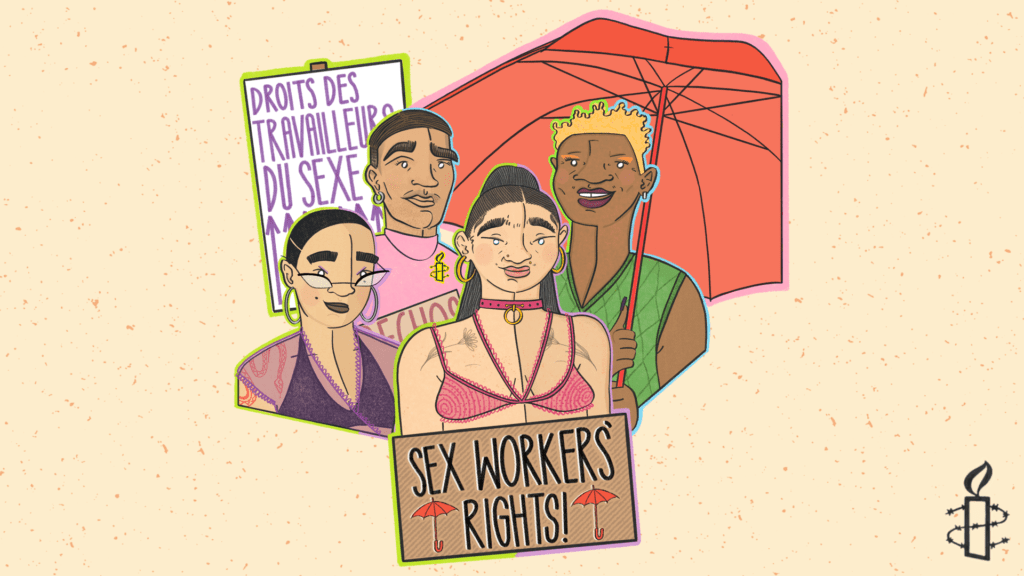
this is not a sex workers’ issue. This is an issue of oppression.
“Five”
“It’s less about giving sex workers ‘special this and special that’ … but I think that the core point here that this is not a sex workers’ issue. This is an issue of oppression…A true community is inclusive and supportive”, stress “Five”, a migrant sex worker.
It’s time to stand in solidarity with the growing sex worker-led rights movements in Ireland and elsewhere.
We must ensure they are not subjected to violence, forced labour or trafficking, that States repeal laws that criminalize sex work and harm sex workers, and guarantee their human rights are upheld.
It is time to end gender-based violence, systemic inequalities, poverty and discrimination that keep sex workers and others at the margins.
Fight with them now for a fairer society.
Sex workers in Ireland are standing up for their rights: share their stories! It’s time to destigmatise and decriminalise sex work and guarantee everyone’s human rights. https://ift.tt/3Akh8aw
“Try listening to the people who actually know what’s going on”
Source: Global Pinoys PH

0 Comments